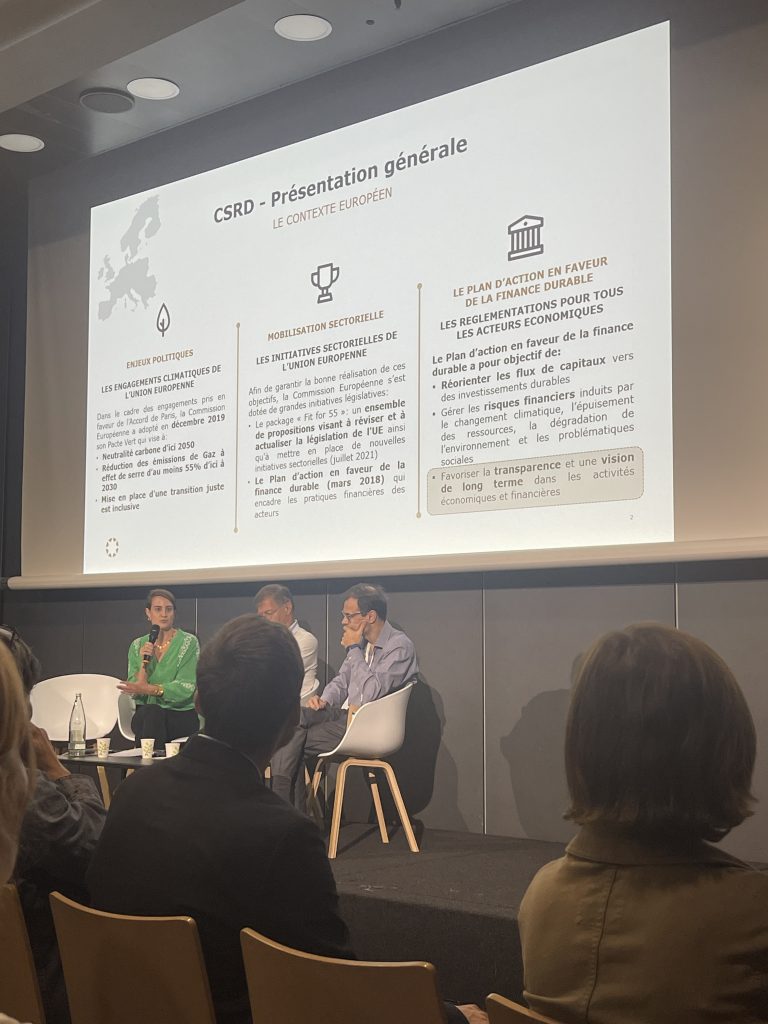
Comment les banques doivent accompagner le financement de l’AgriTech ?
Les banques ont un rôle clé et central pour accompagner le financement de l’AgriTech en France. L’ensemble de l’agriculture française doit répondre à des enjeux
Le salon Produrable est le rendez-vous annuel incontournable pour tous les acteurs de l’économie sociale et solidaire et du développement durable. Comme chaque année, plusieurs iQers sont présents pour assister aux conférences et échanger avec les solutions et entreprises qui font bouger les lignes du Positive Impact. Plusieurs thèmes ont retenu leur attention…

Depuis 2007, PRODURABLE est le plus grand rendez-vous européen des acteurs et des solutions en faveur de l’économie durable. Organisé sous le haut patronage du Ministère de la Transition Écologique et de la Cohésion des Territoires, le salon PRODURABLE rassemble pendant deux jours :
Nous savons comment réduire les émissions de gaz à effet de serre(...). Mais notre culture et nos valeurs nous empêchent d’utiliser ce que nous savons. La question climatique relève moins d’un enjeu technologique que d’un enjeu culturel.
Dennis Meadows
Scientifique et physicien
En 2021, nous avions fait un focus sur le sujet de la Finance responsable tant le sujet était d’actualité aussi bien sur le plan économique que règlementaire (lire : Impact Positif : la transition nette zéro des entreprises pourra-t-elle se suffire de l’émergence d’un cadre normatif toujours plus exigeant ?)
Cette année, en 2023, le salon Produrable a choisi de placer les Culture(s) comme thème central.
Même sur des outils comme le numérique qui demeurent « nouveaux » à l’échelle de l’économie, les pratiques n’ont pas intégré par défaut les enjeux responsables.
Aujourd’hui, le numérique représente 4% des gaz à effet de serre. Si Internet permet de s’affranchir des frontières et de limiter des déplacements et voyages, il est à la fois une solution mais aussi une partie du problème. Il est nécessaire de définir une empreinte environnementale du numérique au travers d’un référentiel commun. Toutefois, la question de tout référentiel est alors de savoir où il commence et où il se termine, qu’est-ce qui est pris en compte et ce qui ne doit pas l’être.
D’un côté les géants du Web et notamment de la vidéo en ligne (plateformes de streaming, Youtube, réseaux sociaux…) doivent questionner leurs pratiques. C’est pour cette raison que l’Arcom a dressé une liste de recommandations pour les plateformes de streaming comme Netflix, Amazon Prime Video ou encore YouTube. En tête de liste : la réduction de la qualité de l’image et un mode « éco » à proposer aux utilisateurs.
De l’autre côté, c’est également au niveau de chaque utilisateur d’adopter des gestes responsables sur le numérique. « Le numérique est notre avenir, économisons-le » pourrait résumer parfaitement la philosophie à adopter.
Enfin, l’enjeu est aussi au niveau de chaque site web avec la mesure de l’indice environnemental et le « sustainability by design ». On voit que sur certains sujets le règlementaire facilite l’adoption de pratiques responsables par tous. Prenons par exemple le RGPD. Avant le RGPD, c’était le Far West de la data. Aucune règlementation commune permettait de favoriser l’adoption de pratiques éthiques sur la collecte et l’utilisation des données personnelles. Désormais, c’est devenu un réflexe. Il faut que ce soit le même réflexe qui soit adopté en matière de design de sites web et d’applications mobiles.


Plusieurs règlementations, déjà en place ont poussé les entreprises à développer le suivi des informations et les KPI extra-financiers par la fonction finance en lien avec la RSE (voir notre article : La finance au coeur des démarches à impact positif) :
La dernière règlementation adoptée au niveau européen est la CSRD en 2023. La Corporate Sustainability Reporting Directive vise à :
Elle vient ainsi remplacer l’actuel NFRD.

Les banques ont un rôle clé et central pour accompagner le financement de l’AgriTech en France. L’ensemble de l’agriculture française doit répondre à des enjeux

Du 15 au 17 septembre se tenait le salon PRODURABLE, à Paris. Le salon PRODURABLE est le plus grand rendez-vous européen des acteurs et des

L’urgence climatique, la recherche de sens et de marques responsables conduisent les entreprises à multiplier les initiatives, non seulement pour ne pas nuire, mais surtout
